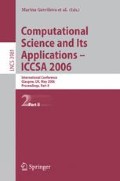Abstract
Software product line engineering is a method that prepares for future reuse and supports seamless reuse in the application development process. A domain architecture, sharing a common software architecture across a product line, brings a core set of knowledge and assets to the development process. Domain architectures reduce the complexity and cost of developing and maintaining code. However, technically excellent domain architectures do fail, often because they are not effectively developed. The key concept in the development of domain architecture is variability, the ability to derive various products from the product family. Variability occurs at different levels. It is important to consider variability at the higher architectural levels, and not only at the code level. In this paper, we suggest a method of producing architectures that will be core assets in the product line. We describe a domain architecture where commonality and variability are explicitly considered.
This research was supported by the MIC(Ministry of Information and Communication), Korea, under the ITRC(Information Technology Research Center) support program super-vised by the IITA(Institute of Information Technology Assessment).
Access this chapter
Tax calculation will be finalised at checkout
Purchases are for personal use only
Preview
Unable to display preview. Download preview PDF.
References
Muthig, D., Atkinson, C.: Model-Driven Product Line Architecture. In: Chastek, G.J. (ed.) SPLC 2002. LNCS, vol. 2379, p. 110. Springer, Heidelberg (2002)
The Object Management Group (OMG), Reusable Asset Specification (RAS) Version 2.2 (November 2005), http://www.omg.org/technology/documents/formal/ras.htm
Moon, M., Yeom, K., Chae, H.S.: An Approach to Developing Domain Requirements as a Core Asset Based on Commonality and Variability in a Product Line. IEEE Transactions on Software Engineering 31(7), 551–569 (2005)
Kang, K.C., Kim, S., Lee, J., Kim, K.: FORM: A Feature-Oriented Reuse Method with Domain Specific Reference Architectures. Annals of Software Engineering 5, 143–168 (1998)
Kang, K., Cohen, S., Hess, J., Novak, W., Peterson, S.: Feature-Oriented Domain Analysis (FODA) Feasibility Study. Technical Report CMU/SEI-90-TR-21, Software Engineering Institute, Carnegie Mellon University (November 1990)
Keepence, B., Mannion, M.: Using patterns to model variability in product families. IEEE Software 16(4), 102–108 (1999)
Gomma, H.: Designing Software Product Lines with UML. In: From Use Cases to Pattern-Based Software Architectures. Addison-Wesley, Reading (2004)
Author information
Authors and Affiliations
Editor information
Editors and Affiliations
Rights and permissions
Copyright information
© 2006 Springer-Verlag Berlin Heidelberg
About this paper
Cite this paper
Moon, M., Yeom, K. (2006). An Approach to Developing Domain Architectures Based on Variability Analysis. In: Gavrilova, M.L., et al. Computational Science and Its Applications - ICCSA 2006. ICCSA 2006. Lecture Notes in Computer Science, vol 3981. Springer, Berlin, Heidelberg. https://doi.org/10.1007/11751588_46
Download citation
DOI: https://doi.org/10.1007/11751588_46
Publisher Name: Springer, Berlin, Heidelberg
Print ISBN: 978-3-540-34072-0
Online ISBN: 978-3-540-34074-4
eBook Packages: Computer ScienceComputer Science (R0)

